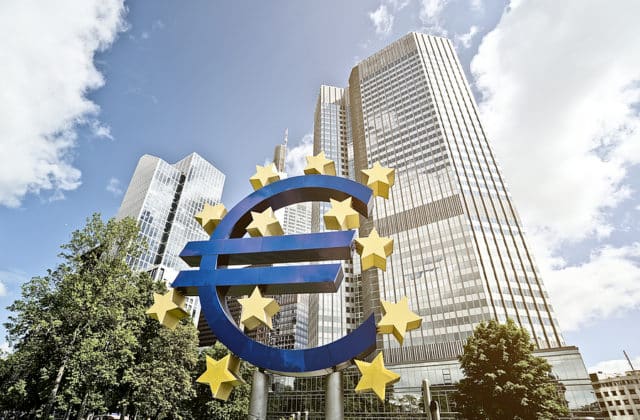Europeans are satisfied about their economy than they’ve been in almost six years, however you wouldn’t know it by taking a gander at the business sectors.
Speculators dumped bonds and stocks over the locale on Monday, prodded by a conjunction of dangers that reverberated the euro-zone obligation emergency. French and Italian decision crusades fed worries over the ascent of hostile to euro political forces, while expansion in Germany flagged European Central Bank boost may not last any longer. Interim, Greece, the impetus for the first emergency, achieved another intersection with its lenders.
Speculators are turning out to be progressively worried that the wellbeing net – as ECB QE – is not as solid as maybe it was already accepted to be. The “sedative” that money related jolt used to give is wearing off as populism rises as a “far more prominent risk than anybody had trusted it to be.
The local elements behind the selloff are an update that turbulence in European markets didn’t simply start with the decision of U.S. President Donald Trump, whose movement approaches have likewise shaken markets this week.
Yields on French and Italian securities moved to their most abnormal amount with respect to German obligation since 2014 on Monday, while Portuguese securities tumbled. The Swiss franc, a safe house money, shut at its most grounded level versus the euro in very nearly year and a half. Stocks were additionally contaminated by worries over awful advances, while the cost of protecting high return obligation spiked, and Greek markets withdrew.
The defeat resisted information on Monday that demonstrated a list of official and buyer notion rose to 107.9 in January, outperforming the middle gauge in a study of financial specialists. It’s the most astounding perusing since March 2011.
Financial specialists disregarded those indications of hopefulness to some degree since German swelling neared 2 percent in January, adding confidence to the contention that ECB security buys, which have to a great extent protected markets from geopolitical dangers since their initiation in 2015, may not be a changeless component. With the pace of boost officially due to be downsized for the current year, a supported move higher in expansion may make it politically troublesome for the national bank to delay. A report Tuesday demonstrated French development quickened in the final quarter as a component of a more extensive monetary extension in the district, adding more fuel to the level headed discussion about how rapidly the ECB ought to trim its buy program.
Still, Monday’s selloff in French bonds was to a great extent activated by an outrage including presidential leader Francois Fillon, who’s confronting allegations that he may have infringed upon the law by utilizing his better half as a parliamentary right hand. Any withdraw in Fillon’s fame may make ready for hostile to euro patriot Marine Le Pen.
Italian securities, in the interim, withdrew as a protected court opened the route for snap races that may likewise proclaim the ascent of populist administration. UniCredit SpA fell 5.5 percent in Rome after the ECB requested an enhanced arrangement for managing terrible credits before the finish of February.
In Athens, stocks declined to their most reduced since Dec. 15 as the legislature conceded that 66% of the activities leasers have requested for the dispensing of the following tranche of crisis credits still can’t seem to be finished.
Value markets headed lower in the U.S. too; with the S&P 500 record posting its greatest decay since December as worries over Trump’s noninterventionist arrangements likewise thumped worldwide hazard opinion.
While the drop in Europe’s more dangerous resources is aromatic of moves amid the obligation emergency, it likewise filled in as an indication of how far business sectors have gone under the impact of ECB support. Italian 10-year yields came to at a 18-month high of at 2.35 percent on Tuesday, yet they’re still short of what 33% of levels in 2011. Comparable rates in Portugal and Greece are considerably smaller divisions of levels since amid the emergency.
To conclude, here are some facts on the European Debt Crisis provided by CNN. July 11, 2011 – A weapons blast at a maritime base kills 13 individuals and annihilates the nation’s principle control station. The subsequent power outages seriously affect the tourism and fund divisions of the economy. December 23, 2011 – After a progression of credit minimization and introduction to the money related emergency in Greece, Cyprus consents to an arrangement with Russia for a crisis advance worth €2.5 billion to shore up its economy.
Cyprus consents to pay the credit back more than 4.5 years with a 4.5% financing cost. June 25, 2012 – The administration of Cyprus reports that it will look for a bailout from the European Union (EU) and the International Monetary Fund (IMF) to prop up its banks. As per the IMF, banks in Cyprus have roughly €152 billion in remarkable advances or other cash at hazard, which is eight, circumstances the nation’s total national output.










